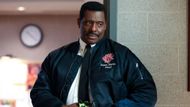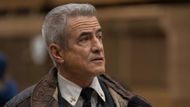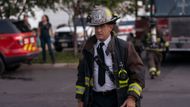For more than a decade, Chicago Fire has been the pulse of NBC's prime-time lineup. It's not just firetrucks and cinematic rescues, but a show about loyalty, toughness, and what it truly is to run into danger while everyone else runs away. Filmed in Chicago, the show documents the daily mayhem—and profound human connections—within Firehouse 51.
What started in 2012 as a launchpad for the "One Chicago" franchise quickly became a fan favorite and spawned spin-offs like Chicago P.D., Chicago Med, and a short-lived courtroom spin-off, Chicago Justice. But through it all, Chicago Fire stayed grounded in the lives of its core group: firefighters, paramedics, and rescue squad members who behave like a family.
One of the strongest anchors in Chicago Fire has been Battalion Chief Wallace Boden. Steady, wise, and fiercely loyal to his firefighters, Boden (Eamonn Walker) did more than anything to establish the heart of Firehouse 51. So when Season 12 ended on his exit, it was not so much a changing of the guard as a complete new era.
Stepping into that space was Chief Dom Pascal, brought to life by Dermot Mulroney. His arrival wasn't about entering into a pair of oversized boots—it was about a shift in leadership, tone, and energy. Pascal wasn't just challenging the crew by himself—he was challenging the show itself to grow in new directions.
From the legacy of Boden to the impact of Pascal’s leadership, we’ll explore how Chicago Fire is evolving and why this character shift could redefine the series for seasons to come.
The backbone of Chicago Fire: Chief Wallace Boden

For a dozen years, the reign of Firehouse 51 was guided by a calm and steady hand—Battalion Chief Wallace Boden. Played by Eamonn Walker, Boden was the boss man, but he was the conscience of the firehouse as well.
Level-headed in times of turmoil, fair-minded in matters of judgment, and generously loyal to the men, Boden governed with a mixture of grit and empathy that made him both a mentor and a father figure to the firefighters.
But no captain lives forever. At the end of Chicago Fire Season 12, Boden was promoted to Deputy Commissioner of the Chicago Fire Department. It was a big career jump—and one he well earned. His promotion, though, left a big gap at Firehouse 51.
Without Boden's steady hand, the team had a new hurdle: adjusting to change at the top.
Meet the new chief: Dom Pascal

When Eamonn Walker's Wallace Boden was promoted, it was more of a closing of an era than a promotion. Firehouse 51 required a new captain, and that was when Dermot Mulroney came into the spotlight.
Best known for legendary roles in My Best Friend's Wedding, August: Osage County, Shameless, and more recently Secret Invasion, Mulroney introduced his dramatic acting chops to Chicago Fire.
Mulroney's first character as a regular, Chief Dom Pascal, emerged in the Season 13 premiere, Monster in the Field. He's not a new guy to Chicago—Pascal started his career as a fireman in the city and then worked in Miami for several years. He's back now with a mix of hometown roots and out-of-town qualifications that make him a new but unfamiliar factor to the team.
Filling in for someone like Boden isn’t just a big job—it’s a delicate one. Pascal stepped into a home built on loyalty, tradition, and solid relationships. He wasn't trying to be Boden 2.0. Instead, he brought his own leadership, his own background, and a clear desire to honor with the right tools.
The question was: would the team listen?
Chief Dom Pascal’s storyline and leadership style

Adapting to a new captain is never easy, especially when the previous one was so well-liked as Chief Boden. So when Chief Dom Pascal came strutting into Firehouse 51, the team was wary. They didn't know what to expect from the new guy with the big job.
But Pascal didn't waste time proving that he fit in. On one of his first calls—a high-drama, high-stress fire at a local smoke shop—he didn't just yell orders from the sidelines. He ran in, helped with evacuations, and showed everyone that he wasn't the kind of guy to send someone into danger without being right on their heels.
Paramedic Novak (Jocelyn Hudon) described it best:
"I think he's missing the fear gene."
Chief Pascal does it all confidently, with a sense of urgency, and in a no-nonsense, hands-on style. Whereas Boden had a style of leading with quiet strength and deep emotional connection, Pascal offers energy, directness, and a willingness to rock the boat if it's called for.
His time in Miami had an impact on his style, and he's retained some of that outside experience. That's required changes in how Firehouse 51 operates—new routines, faster response times, and some procedures the crew isn't used to yet.
What Chief Dom Pascal wants from Firehouse 51

Firehouse 51 Chief Dom Pascal didn't come to the firehouse with a job opening to fill—he came with a vision. As Chief, he's been resolute in his plan: strengthening one of Chicago's most prestigious firehouses. But the journey to get there hasn't been smooth.
From day one, Pascal made it clear: Firehouse 51 has a reputation to uphold. And he's here to make sure that it not only stays exceptional, but it gets even better. With years of hands-on experience, including having commanded in Miami, Pascal supplied street cred and vision.
In the season's premiere episode, we see him leading grueling drills, analyzing response times, and refining procedures. He calls for faster reflexes, faster reactions, and no shortcuts.
Pascal entered a tight-knit family, and initial tension was inevitable. Guys like Herrmann weren't hesitant to share their doubts. Rather than fighting them, Pascal opened up the floor. In an impressive opening scene, he hosts a house party, sets his standards high, and demands honesty in return. When the team saw him enter a smoldering smoke shop unflinchingly, actions spoke louder than words.
Pascal is not here to change everything, but he is not here to preserve the way things are either. He enjoys what is special about 51 but believes tradition and innovation can work together. That union comes in Episode 3, where he introduces new safety procedures—derived from learning in Miami—that at first agitate neck feathers but ultimately help him through a dangerous hazmat response.
Moreover, Season 13 delves into Pascal's history in heartbreaking detail. We learn he lost his wife, Monica, in a car crash—and that still hurts him.
In Episode 21 of Chicago Fire, Firehouse 51 responds to an accident with the same driver who caused Monica's death, triggering a painful memory and an arson investigation that puts Pascal in the hot seat.
Instead of allowing grief to cloud his judgment, he relinquishes command temporarily to save the house's good name.
Additionally, when Pasca sees Novak stand her ground amid the hectic multi-car pileup, he supports her promotion—proof that he's not simply watching, he's investing. He even schedules relaxed hangouts off-duty to create morale. Bit by bit, the walls start breaking down.
Chief Pascal doesn't just command fires—he fights battles off the books, too. He's fighting inspectors, pushing back against bureaucracy, and keeping Firehouse 51 dedicated to saving lives, not getting pulled into politics.
Whether negotiating with city politicians or fighting for the crew's protection from backlash in investigations, Pascal is always the champion of his crew.
